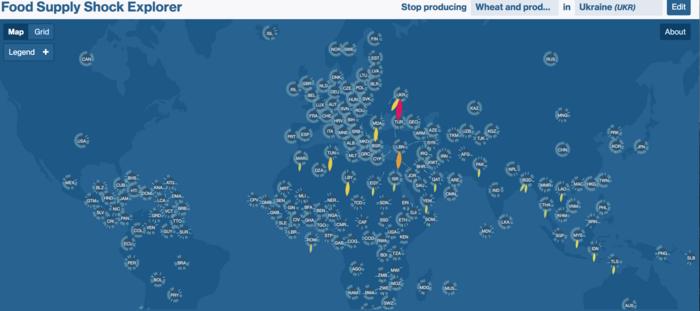[Vienna, August 7 2024] — The ongoing war between Russia and Ukraine has led to severe humanitarian crises, including widespread food shortages. According to the United Nations World Food Programme, an estimated 11 million Ukrainians—about one-third of the population—were at risk of hunger in 2023. This crisis, exacerbated by supply chain disruptions and extreme weather events, could increase diabetes prevalence not only in Ukraine but globally, argue Peter Klimek and Stefan Thurner from the Complexity Science Hub in a commentary published in the journal Science.

Credit: Complexity Science Hub
[Vienna, August 7 2024] — The ongoing war between Russia and Ukraine has led to severe humanitarian crises, including widespread food shortages. According to the United Nations World Food Programme, an estimated 11 million Ukrainians—about one-third of the population—were at risk of hunger in 2023. This crisis, exacerbated by supply chain disruptions and extreme weather events, could increase diabetes prevalence not only in Ukraine but globally, argue Peter Klimek and Stefan Thurner from the Complexity Science Hub in a commentary published in the journal Science.
Malnutrition during early pregnancy is known to elevate diabetes risk later in life. With 187,000 children born in Ukraine in 2023, Klimek and Thurner suggest that the current diabetes prevalence rate of 7.1% could result in an additional 13,000 to 19,000 cases of diabetes in this birth cohort alone.
Global impact
Globally, the disruption of crucial food exports due to the conflict has pushed an estimated 23 million people into hunger. Considering other supply chain interruptions and weather-related shocks, projections suggest that up to 122 million more people could suffer from hunger compared to 2019. “This could potentially lead to up to 180,000 additional Type 2 diabetes cases worldwide,” the researchers say.
They caution that while these estimates are not intended to be quantitative predictions, they do underscore the profound and often overlooked—especially indirect—effects of geopolitical events on public health.
Ukraine – a key producer
Prior to the war, Ukraine was a major global agricultural producer, ranking as the largest exporter of sunflower oil, the fourth-largest exporter of corn, and the fifth-largest exporter of wheat. The modeled impacts of Ukraine’s agricultural production loss suggest that countries like Moldova, Libya, Lebanon, and Tunisia could face significant wheat shortages, with extensive repercussions for food products that rely on wheat as an ingredient.
Why this matters
Klimek and Thurner emphasize the importance of addressing these indirect consequences of conflicts and supply chain disruptions: “Our estimates are meant to illustrate the scale of the impact on public health, so that health authorities can become aware of these emerging high-risk groups and potentially adjust screening and early prevention measures for the coming decades,” the researchers stated. They also stress the urgent need to diversify global food supply chains and reduce dependencies.
Famine and diabetes
The link between hunger and diabetes is well-documented, with studies from historical famines in the Netherlands, China, and Austria, for example, showing that malnutrition during early pregnancy can significantly increase type 2 diabetes risk later in life. Recent research into the Ukrainian famine of 1932-33 by Lumey et al. has provided new insights into this relationship at a more granular level. By analyzing monthly birth cohorts and regional variations in famine severity, they found that severe malnutrition during early pregnancy can increase diabetes risk by 1.5 to 2 times.
This heightened risk is believed to stem from metabolic changes triggered by fetal exposure to poor nutrition, which prepares the body for a nutrient-scarce environment. When this environment changes, the mismatch can result in a higher likelihood of developing diabetes.
About CSH
The Complexity Science Hub (CSH) is Europe’s research center for the study of complex systems. We derive meaning from data from a range of disciplines – economics, medicine, ecology, and the social sciences – as a basis for actionable solutions for a better world. Established in 2015, we have grown to over 70 researchers, driven by the increasing demand to gain a genuine understanding of the networks that underlie society, from healthcare to supply chains. Through our complexity science approaches linking physics, mathematics, and computational modeling with data and network science, we develop the capacity to address today’s and tomorrow’s challenges.
Journal
Science
Method of Research
Computational simulation/modeling
Subject of Research
People
Article Title
The lasting effects of famine
Article Publication Date
8-Aug-2024



